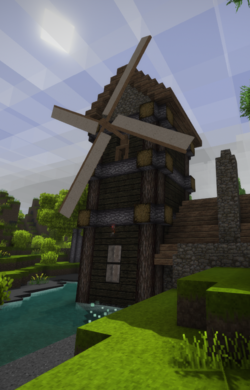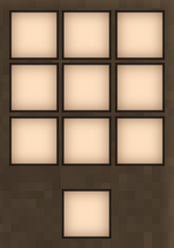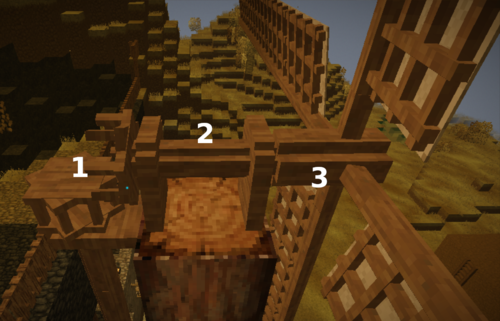Windmill: Difference between revisions
m (Game navbox) |
(removed tnt) |
||
| Line 106: | Line 106: | ||
</translate> | </translate> | ||
{{ | {{Game navbox}} | ||
Revision as of 20:36, 5 August 2023
A windmill is a multi-block structure used to harness wind and transform it into mechanical power. Currently, wind power can be used to automate querns, helve hammers, and pulverizers. Out of these, only the quern can be used manually, without any need for mechanical power.
Considerations for the Structure
Clearance
A structure with sufficient height and clearance is needed to accommodate the sails, the power train, and associated equipment e.g. quern, helve hammer, etc. Sails too low to the ground may not receive enough wind speed to generate any wind power, likewise, a structure with insufficient clearance might deter the sails from rotating correctly. A windmill can be added onto existing structures as long as it meets the previously mentioned qualifications.
Height and Location
The location and height of the structure can also affect the amount of power generated. On a technical level, wind speed varies from region to region and is linearly interpolated between the 4 nearest weather regions, for a given block location. Windspeed will increase by 1% per block above your world's sea level + 10. So if you have a standard world of 256 height, your sea level will be 110. At Y-level 121, you will get 1% additional wind speed. The maximum bonus is 50%. Conversely, wind speeds below sea level are reduced 50% at 4 blocks below and 66% at 8 blocks below, rapidly decreasing towards 100% reduction. Note that wind speeds will naturally vary at times and there may be no wind at all at other times.
Materials
To create a windmill, a player needs:
Windmill rotor
The mechanism that supports the rotating sails. Each windmill requires one rotor to work, and each rotor can support up to 5 sets of sails.
| Ingredients | Crafting Recipe |
|---|---|
| Any hammer + Any chisel + Any log (2x) + Resin + Fat |
Set of Sails
The wind-catching part that allows for the generation and harness of wind power. Each set of sails will increase the power output by 25% and require one full block of clearance. If the sails do not have space to move freely, they will break and fall to the ground below.
| Ingredients | Crafting Recipe |
|---|---|
| Sticks (6x) + Linen (4x) |
Sails are constructed in sets, with one set containing four sails, that means each set takes:
| Sails | 1 set | 2 sets | 3 sets | 4 sets | max 5 sets |
|---|---|---|---|---|---|
| Sticks | 6 | 12 | 18 | 24 | 30 |
| Linen | 4 | 8 | 12 | 16 | 20 |
Wooden Axles
Used to transmit the wind power in a straight line. These may be placed vertically or horizontally in any of the cardinal directions.
| Ingredients | Crafting Recipe |
|---|---|
| Any hammer + Any chisel + Any log + Fat |
Angled Gears
Allows the mechanical power to make a right angle turn by connecting a horizontal axle to a vertical one. Usually optional, but often needed depending on the design of the power train.
| Ingredients | Crafting Recipe |
|---|---|
| Any hammer + Any saw + Any chisel + Stick (2x) + Any log + Resin + Fat |
Building the Windmill
The windmill requires at least 5 blocks of vertical space between the rotor and the ground or any other solid block to accommodate a full complement of 5 sets of Sails.
For power train designs, please see mechanical power.
Video Tutorials
| How To Build A Windmill & Automate a Quern. |
|---|
| Wiki Navigation | |
|---|---|
| Vintage Story | Guides • Frequently Asked Questions • Soundtrack • Versions • Controls |
| Game systems | Crafting • Knapping • Clay forming • Smithing • Cooking • Temperature • Hunger • Mining • Temporal stability • Mechanical power • Trading • Farming • Animal husbandry |
| World | World generation • Biomes • Weather • Temporal storms |
| Items | Tools • Weapons • Armor • Clothing • Bags • Materials • Food |
| Blocks | Terrain • Plants • Decorative • Lighting • Functional • Ore |
| Entities | Hostile entities • Animals • NPCs • Players |
| Miscellaneous | List of client commands • List of server commands • Creative Starter Guide • Bot System • WorldEdit • Cinematic Camera • Adjustable FPS Video Recording • ServerBlockTicking |


